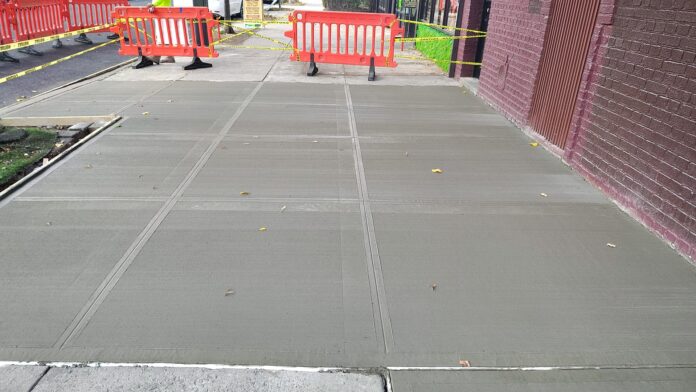A cracked or damaged sidewalk isn’t just an eyesore—it’s a potential safety hazard that can lead to accidents. Whether you’re a homeowner or a business owner in Brooklyn, maintaining your sidewalk is crucial for safety and compliance with local regulations. But before jumping into a sidewalk replacement project, there are a few important factors you need to consider. Understanding these details will help you make informed decisions, avoid unnecessary expenses, and ensure the longevity of your new sidewalk.
1. Understanding the Local Regulations
Brooklyn, like the rest of New York City, has strict rules regarding sidewalks. The Department of Transportation (DOT) is responsible for enforcing these regulations, and property owners must comply with their guidelines. Before replacing your sidewalk, make sure you’re aware of the rules, such as the type of material allowed, proper slope, and drainage requirements. If your sidewalk has received a DOT violation, you may need to act quickly to avoid further penalties.
Working with a local expert familiar with these regulations is essential. They will ensure that your project complies with all legal requirements, helping you avoid fines and additional costs down the line. A quick search of reputable sidewalk contractors in Brooklyn will lead you to professionals who understand these nuances.
2. Assessing the Condition of Your Sidewalk
Before you decide to replace your sidewalk, it’s important to assess its condition. Not all damaged sidewalks require a full replacement; in some cases, repairs might be a more cost-effective solution. For instance, if you notice minor cracks or surface-level issues, resurfacing could restore your sidewalk without the need for tearing it out entirely.
However, if you’re dealing with broken sidewalks that have large cracks, uneven surfaces, or trip hazards, a full replacement may be necessary. Hiring a contractor who specializes in sidewalks in Brooklyn can help you determine whether a repair or replacement is the best option for your specific situation.
3. Choosing the Right Materials
The material you choose for your sidewalk replacement is another crucial factor. Concrete is the most common material used for sidewalks due to its durability, cost-effectiveness, and ability to withstand heavy foot traffic. However, not all concrete is created equal. Make sure to choose high-quality concrete that is specifically designed for outdoor use and is resistant to weather damage. This will help ensure your sidewalk lasts for years to come.
Working with a local expert ensures that you are guided in selecting materials suitable for Brooklyn’s weather conditions. They can also help you choose other options if you prefer decorative finishes, such as stamped or colored concrete.
4. Evaluating Costs and Budget
Sidewalk replacement can be a significant investment, and it’s important to budget accordingly. Factors such as the size of the sidewalk, the materials you choose, and any necessary permits will impact the overall cost. It’s wise to obtain quotes from several local experts to compare prices and services.
While it might be tempting to go with the cheapest option, remember that quality is key. Hiring experienced professionals ensures the job is done right the first time, which can save you money on future repairs. A properly installed sidewalk can last decades, making it worth the upfront cost. Be sure to visit the websites of reputable contractors in Brooklyn to gather information on their services and pricing.
5. Timing and Project Duration
Another important factor to consider is timing. Brooklyn’s weather can impact how long a sidewalk replacement project takes. Harsh winters or rainy seasons may delay the work, so it’s best to plan the project during more favorable weather conditions, such as late spring or early fall. Discussing the timeline with your contractor will help you avoid unexpected delays.
Additionally, ask your contractor about the expected duration of the project. A typical sidewalk replacement may take anywhere from a few days to a week, depending on the size and complexity of the job. Being prepared for this timeframe will help you plan accordingly, especially if the project affects access to your property.
6. Hiring the Right Contractor
Perhaps the most crucial step in the process is hiring the right contractor. Your contractor will not only carry out the work but also guide you through obtaining necessary permits, choosing the right materials, and ensuring compliance with local regulations. Look for contractors with strong reputations and experience in Brooklyn.
Take time to read reviews, check portfolios, and speak with past clients. If you’re unsure where to start, a simple visit to the website of a well-known contractor can provide valuable information. Additionally, you’ll want to hire a team that specializes in dealing with broken sidewalks, as they will have the specific knowledge needed for a successful replacement.
Final Thoughts
Replacing a sidewalk is a significant project that requires careful planning and attention to detail. From understanding local regulations to choosing the right materials and hiring the best contractor, each step plays a crucial role in the outcome of your project. By considering these factors, you can ensure that your new sidewalk is safe, durable, and compliant with Brooklyn’s standards.
If you’re ready to move forward with your sidewalk replacement project, take the time to consult a local expert. For more information on professional services and to get started, you can always visit a website that specializes in sidewalks in Brooklyn.
